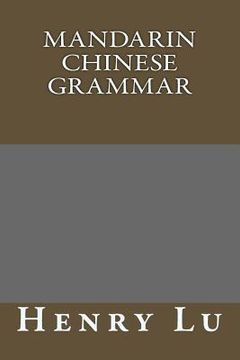Synopsis "Mandarin Chinese grammar (in English)"
Mandarin Chinese has become the official Chinese language after the 1911 revolution, it has been taught in schools for many decades and now virtually every educated Chinese can speak the language. Today, Mandarin Chinese is spoken throughout the country in China, a Western tourist in China will have no trouble communicating with the Chinese in Mandarin Chinese. Some distinctive features of mandarin Chinese: 1. Nouns Quantifiers. Unlike the English language, nouns in Mandarin Chinese need quantifiers, just like articles in English. This often becomes hurdles to be got over in learning Mandarin Chinese. In English, the words 'a, an' can be used to refer to almost any countable nouns, such as a student, a horse. a cow, a camel, a ring, a clock, a tree, and a hair. A is used to refer to the above nouns. On the other hand, however, in Mandarin Chinese the above nouns have their respective quantifiers. 2. Verbs In Verbal Tenses And Voices Remain Unchanged. Other Words, mostly adverbs, are used to indicate different tenses and voices. As an example, if you want to indicate past tense, you may use such words as in the past, yesterday, last year. If you want to indicate future tense, you may use such words as next year, tomorrow, one day, etc. In nouns, no distinction between singuar and plural nouns. The same character stands for both forms. In pronouns, no distinction between subject pronouns (1, he, it, she, we, you) and object pronouns (her, him, it, me, them, us, you). No distinction between singular and plural pronouns (this, these, that, those). 3. There Are Four Common Ways Of Asking Questions. First, use a negative word. This is like the short form of a tag question in English. Second, use interrogative pronouns: Who, Whom, Where, What . Unlike English, nouns in Mandarin Chinese need quantifiers, not unlike articles in English. This often becomes hurdles to be got over in learning Mandarin Chinese. A standard Noun quantifier contains three characters, including one number, one quantifier and one noun. When translated into English, there are three forms: (1) it contains only two words, namely, a number and a noun, but no quantifier, such as a dog; (2) it contains three words, namely, a number, a partitive as quantifier, and a noun, such as a dose of medicine or a packet of cigarettes.

